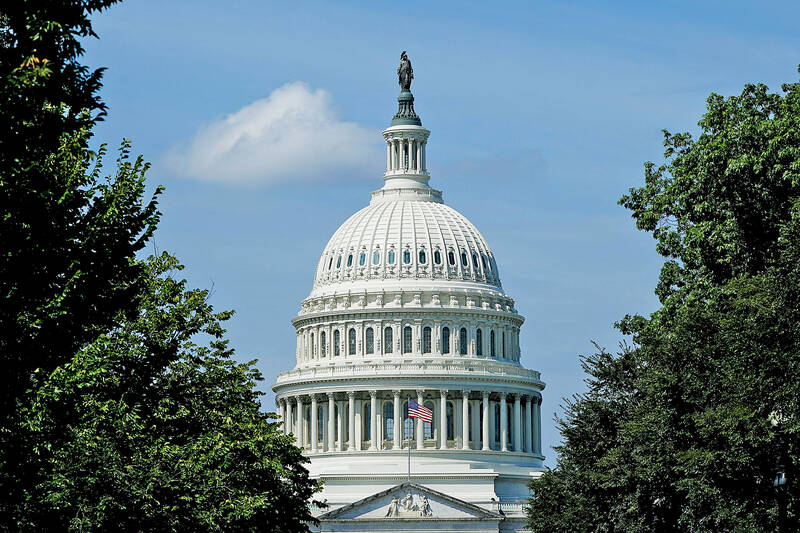A US House of Representatives special committee on China is planning to visit Taiwan in a few months, Nikkei Asia reported yesterday.
The report came amid rising tension between Washington and Beijing after an alleged Chinese surveillance balloon was spotted over the US and later shot down.
US Representative Rob Wittman, a member of the US House Select Committee on Strategic Competition between the United States and the Chinese Communist Party (CCP), told the Japanese news magazine that he and other committee members are in talks on a possible trip to Taiwan.

Photo: Reuters
“We know that will infuriate the Chinese, but I think it’s incredibly important for us to do that [visit Taiwan], because you have to send the signal that we’re strongly on the side of Taiwan,” Wittman said.
The delegation sent by the committee might hold a field hearing in Taiwan if the planned visit is realized, he said.
Wittman last month told Washington-based think tank the Project 2049 Institute that US Representative Mike Gallagher hoped to hold hearings in Taiwan, “as it would be meaningful to the world as well as Taiwan.”
Gallagher chairs the committee, which was founded last month and is scheduled to start officially by the end of this month.
It would examine the CCP from various angles including national security, economy and human rights, Nikkei Asia reported.
By holding hearings on policy issues and proposed bills, the committee can make policy recommendations on China to other committees in the US House of Representatives, it added.
Other high-profile US politicians reported to be considering a visit to Taiwan include US House of Representatives Speaker Kevin McCarthy and US House of Representatives Foreign Affairs Committee Chairman Michael McCaul, who has said that he was planning to lead a delegation to Taiwan this spring.
Representative to the US Hsiao Bi-khim (蕭美琴) last week said that there was no new information about McCarthy’s possible visit.
A TVBS poll released on Friday showed that 56 percent of respondents said they would welcome McCarthy’s visit, while 23 percent did not.
The survey, conducted from Monday last week to Thursday, was based on telephone interviews from 1,171 Taiwanese aged 20 or older. It has a margin of error of 2.9 percentage points.

NATIONAL SECURITY THREAT: An official said that Guan Guan’s comments had gone beyond the threshold of free speech, as she advocated for the destruction of the ROC China-born media influencer Guan Guan’s (關關) residency permit has been revoked for repeatedly posting pro-China content that threatens national security, the National Immigration Agency said yesterday. Guan Guan has said many controversial things in her videos posted to Douyin (抖音), including “the red flag will soon be painted all over Taiwan” and “Taiwan is an inseparable part of China,” while expressing hope for expedited “reunification.” The agency received multiple reports alleging that Guan Guan had advocated for armed reunification last year. After investigating, the agency last month issued a notice requiring her to appear and account for her actions. Guan Guan appeared as required,

A strong cold air mass is expected to arrive tonight, bringing a change in weather and a drop in temperature, the Central Weather Administration (CWA) said. The coldest time would be early on Thursday morning, with temperatures in some areas dipping as low as 8°C, it said. Daytime highs yesterday were 22°C to 24°C in northern and eastern Taiwan, and about 25°C to 28°C in the central and southern regions, it said. However, nighttime lows would dip to about 15°C to 16°C in central and northern Taiwan as well as the northeast, and 17°C to 19°C elsewhere, it said. Tropical Storm Nokaen, currently

PAPERS, PLEASE: The gang exploited the high value of the passports, selling them at inflated prices to Chinese buyers, who would treat them as ‘invisibility cloaks’ The Yilan District Court has handed four members of a syndicate prison terms ranging from one year and two months to two years and two months for their involvement in a scheme to purchase Taiwanese passports and resell them abroad at a massive markup. A Chinese human smuggling syndicate purchased Taiwanese passports through local criminal networks, exploiting the passports’ visa-free travel privileges to turn a profit of more than 20 times the original price, the court said. Such criminal organizations enable people to impersonate Taiwanese when entering and exiting Taiwan and other countries, undermining social order and the credibility of the nation’s

‘SALAMI-SLICING’: Beijing’s ‘gray zone’ tactics around the Pratas Islands have been slowly intensifying, with the PLA testing Taiwan’s responses and limits, an expert said The Ministry of National Defense yesterday condemned an intrusion by a Chinese drone into the airspace of the Pratas Islands (Dongsha Islands, 東沙群島) as a serious disruption of regional peace. The ministry said it detected the Chinese surveillance and reconnaissance drone entering the southwestern parts of Taiwan’s air defense identification zone early yesterday, and it approached the Pratas Islands at 5:41am. The ministry said it immediately notified the garrison stationed in the area to enhance aerial surveillance and alert levels, and the drone was detected in the islands’ territorial airspace at 5:44am, maintaining an altitude outside the effective range of air-defense weaponry. Following